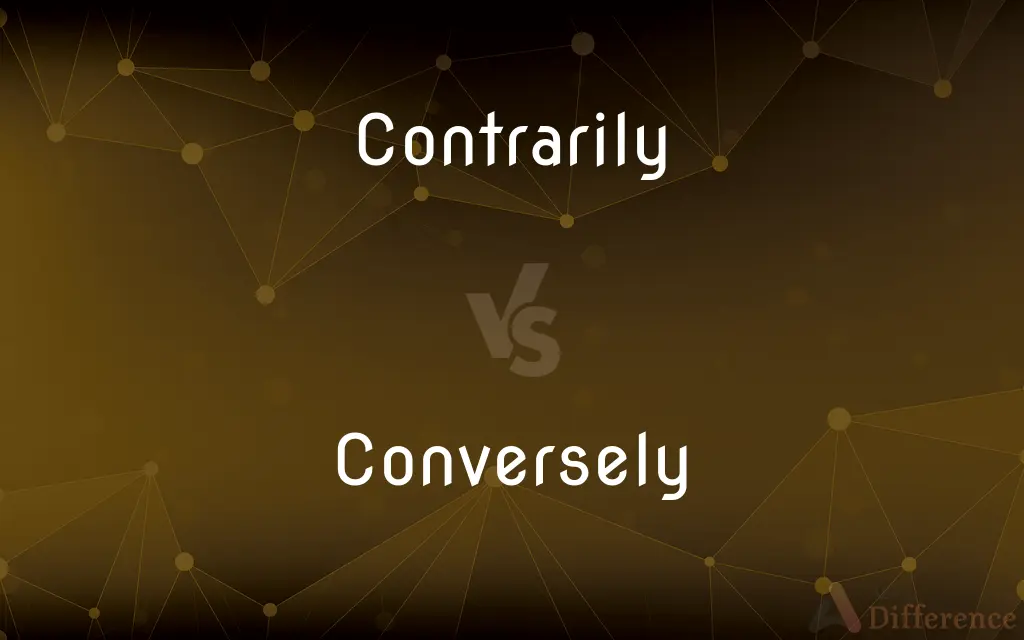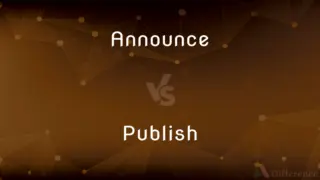Contrarily vs. Conversely — What's the Difference?
By Tayyaba Rehman & Fiza Rafique — Updated on March 30, 2024
Contrarily emphasizes opposition or difference in opinion, while conversely highlights a reversal of conditions or situations, focusing on contrast.

Difference Between Contrarily and Conversely
Table of Contents
ADVERTISEMENT
Key Differences
Contrarily is used to introduce a statement or idea that opposes or differs from the preceding one, emphasizing a direct contradiction or opposing viewpoint. It often sets up an expectation of conflict or divergence in perspectives. Conversely, on the other hand, is used to introduce a statement that presents a situation or fact that is the opposite of the previous one, highlighting a change in direction or condition rather than a direct opposition of ideas.
When arguing, contrarily signals that the forthcoming point will counter the previous one, suggesting a clash in views or facts. It's particularly effective in debates or discussions where two sides of an issue are being explored. Conversely, suggests a pivot or shift in the discussion, leading to a complementary but opposing perspective, useful in discussions that aim to cover all aspects of a topic.
In writing, using "contrarily" prepares the reader for an adversarial or opposing argument, emphasizing a stark contrast in ideas or principles. This word is chosen to strengthen an argument by presenting opposing evidence or viewpoints. Conversely, is chosen to enrich the narrative by presenting alternative scenarios or outcomes, enhancing the complexity of the argument or story.
Contrarily often implies a more significant degree of opposition than conversely, which might merely indicate a different perspective on the same situation. This subtle difference affects how arguments or discussions are perceived, with "contrarily" often leading to a more polarized view and "conversely" suggesting a more nuanced or balanced examination.
In terms of usage, contrarily is less common in everyday conversation and more frequently found in formal debates, academic writing, or sophisticated discourse. Conversely, is more versatile, appearing in both formal and informal contexts, and is often used to smooth transitions between contrasting points in a way that feels natural and less confrontational.
ADVERTISEMENT
Comparison Chart
Definition
Introducing a contrasting statement that shows opposition or difference.
Introducing a statement that presents a situation or fact in the opposite direction.
Emphasis
Opposition, contradiction.
Reversal, change in condition.
Usage Context
Debates, discussions with opposing views.
Discussions exploring different aspects of a topic.
Tone
Often adversarial or emphasizing conflict.
Suggestive of nuance and balance.
Commonality
More formal, less common in everyday language.
Versatile, used in both formal and informal contexts.
Compare with Definitions
Contrarily
Indicative of disagreement or opposition.
He argued contrarily, presenting a very different conclusion.
Conversely
Showing or involving the opposite.
Wealthy citizens donate more, but conversely, they also demand more tax breaks.
Contrarily
Used to introduce a statement that contradicts or opposes.
Contrarily, the evidence suggests that the policy had no significant effect.
Conversely
Used to introduce a contrasting statement that reverses a previous idea.
The city has a high unemployment rate; conversely, rural areas have seen job growth.
Contrarily
Emphasizes conflict or direct opposition in discussions.
Contrarily, I believe this approach undermines our goals.
Conversely
Versatile in presenting opposite scenarios or outcomes.
The north faces water scarcity; conversely, the south suffers from floods.
Contrarily
Opposite in nature, direction, or meaning.
Contrarily to popular belief, some deserts can be quite cold at night.
Conversely
Indicates a shift to an alternative viewpoint or condition.
Summer months are busy; conversely, winter offers a much quieter experience.
Contrarily
Formal expression of contrasting ideas or opinions.
Contrarily, the historical data do not support this interpretation.
Conversely
Bridges contrasting points with less emphasis on conflict.
He prefers classical music; conversely, his sister is a fan of rock.
Contrarily
Opposed, as in character or purpose
Contrary opinions.
Acts that are contrary to our code of ethics.
Conversely
Reversed, as in position, order, or action; contrary.
Contrarily
Opposite in direction or position
Our boat took a course contrary to theirs.
Conversely
Something that has been reversed; an opposite.
Contrarily
(Music) Moving in the opposite direction at a fixed interval
Playing scales in contrary motion.
Conversely
(Logic) A proposition obtained by conversion.
Contrarily
Adverse; unfavorable
A contrary wind.
Conversely
With a reversed relationship.
Contrarily
(also kən-trârē) Given to recalcitrant behavior; willful or perverse.
Conversely
From another point of view; on the other hand.
Contrarily
Something that is opposite or contrary.
Conversely
In a converse manner; with change of order or relation; reciprocally.
Contrarily
Either of two opposing or contrary things
"Truth is perhaps ... a dynamic compound of opposites, savage contraries for a moment conjoined" (A. Bartlett Giamatti).
Conversely
With the terms of the relation reversed;
Conversely, not all women are mothers
Contrarily
(Logic) A proposition related to another in such a way that if the latter is true, the former must be false, but if the latter is false, the former is not necessarily true.
Contrarily
In an opposite direction or manner; counter
The judge ruled contrary to all precedent in the case.
Contrarily
In a contrary manner; in opposite ways or directions.
Contrarily
In a contrary manner; in opposition; on the other side; in opposite ways.
Contrarily
In a contrary disobedient manner
Contrarily
Contrary to expectations;
He didn't stay home; on the contrary, he went out with his friends
Common Curiosities
Can "conversely" be used to introduce an opposing argument?
Yes, but it typically introduces a scenario that contrasts with the previous one rather than directly opposing it.
How does "conversely" enhance a narrative or argument?
It offers a more nuanced view by presenting alternative scenarios or outcomes, adding depth to the discussion.
Are "contrarily" and "conversely" interchangeable?
They can be in some contexts, but they carry different connotations, with "contrarily" emphasizing opposition and "conversely" highlighting a reversal or alternative perspective.
When is it appropriate to use "contrarily" in writing?
In formal writing when introducing a point that directly opposes or contradicts the preceding argument.
Is it common to use "contrarily" in everyday conversation?
It's less common and more often found in formal or academic contexts.
How do "contrarily" and "conversely" contribute to the clarity of communication?
They help by clearly signaling the introduction of contrasting or opposite points, enhancing the listener's or reader's understanding.
What does "contrarily" signify in a discussion?
It signifies direct opposition or contradiction to a previously stated idea or fact.
Can "conversely" be used in both formal and informal settings?
Yes, it's versatile and fits well in both settings, facilitating smooth transitions between contrasting points.
Is "contrarily" only used in negative contexts?
Not exclusively, but it often highlights disagreement or divergence in views.
How do "contrarily" and "conversely" affect the tone of a discussion?
"Contrarily" may create a more adversarial tone, while "conversely" suggests a balanced, nuanced approach.
How should one choose between using "contrarily" and "conversely"?
Consider the degree of opposition or contrast you wish to convey; "contrarily" for direct opposition, "conversely" for a less confrontational contrast.
Does "contrarily" imply a stronger degree of opposition than "conversely"?
Yes, it typically implies a more substantial degree of conflict or opposition.
Do "contrarily" and "conversely" have the same grammatical function?
They both serve as adverbs, introducing contrasting statements or ideas, but their nuances differ.
What is the impact of using "contrarily" on the audience's perception?
It may prepare the audience for a more divisive or contentious point, potentially influencing their receptiveness to the argument.
Can these terms help in structuring arguments or essays?
Absolutely, both terms are useful for organizing contrasting points or perspectives in a coherent manner.
Share Your Discovery

Previous Comparison
Announce vs. Publish
Next Comparison
Forego vs. RelinquishAuthor Spotlight
Written by
Tayyaba RehmanTayyaba Rehman is a distinguished writer, currently serving as a primary contributor to askdifference.com. As a researcher in semantics and etymology, Tayyaba's passion for the complexity of languages and their distinctions has found a perfect home on the platform. Tayyaba delves into the intricacies of language, distinguishing between commonly confused words and phrases, thereby providing clarity for readers worldwide.
Co-written by
Fiza RafiqueFiza Rafique is a skilled content writer at AskDifference.com, where she meticulously refines and enhances written pieces. Drawing from her vast editorial expertise, Fiza ensures clarity, accuracy, and precision in every article. Passionate about language, she continually seeks to elevate the quality of content for readers worldwide.














































